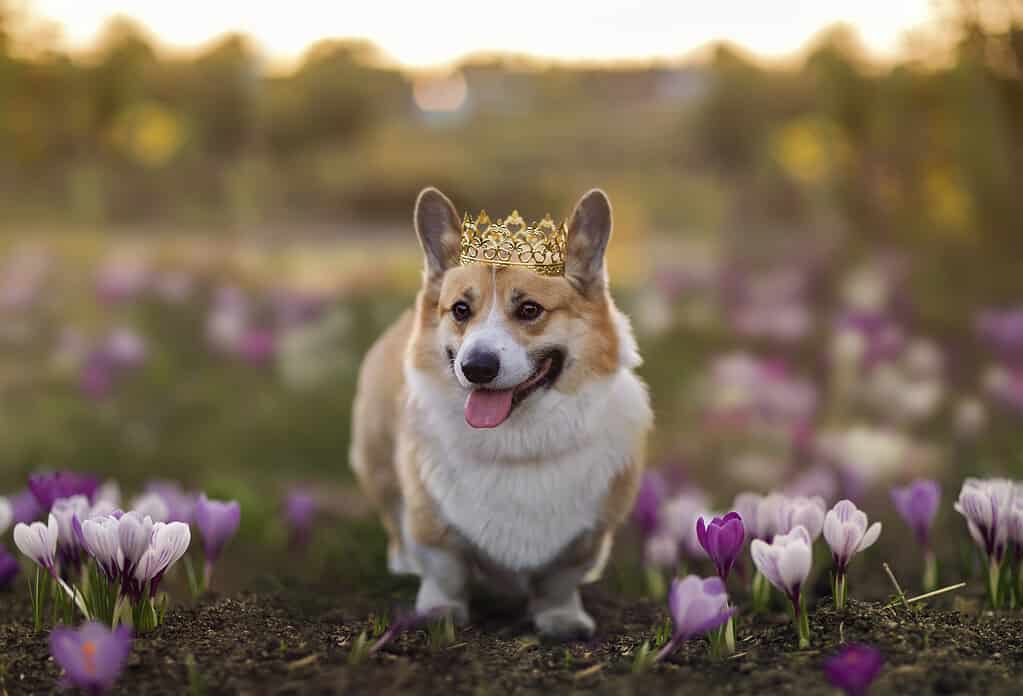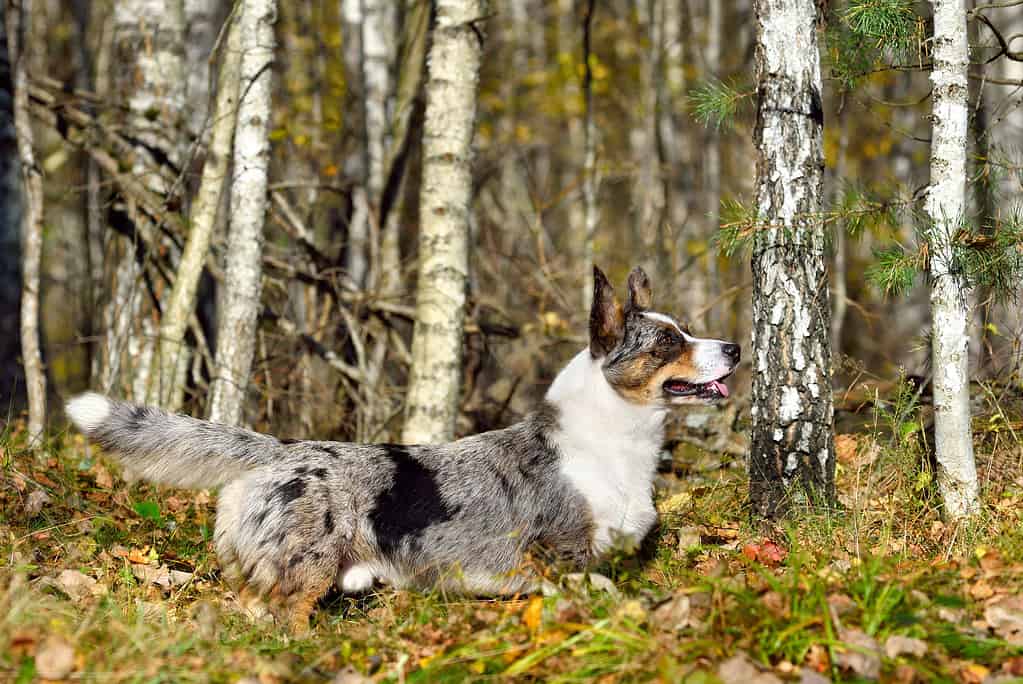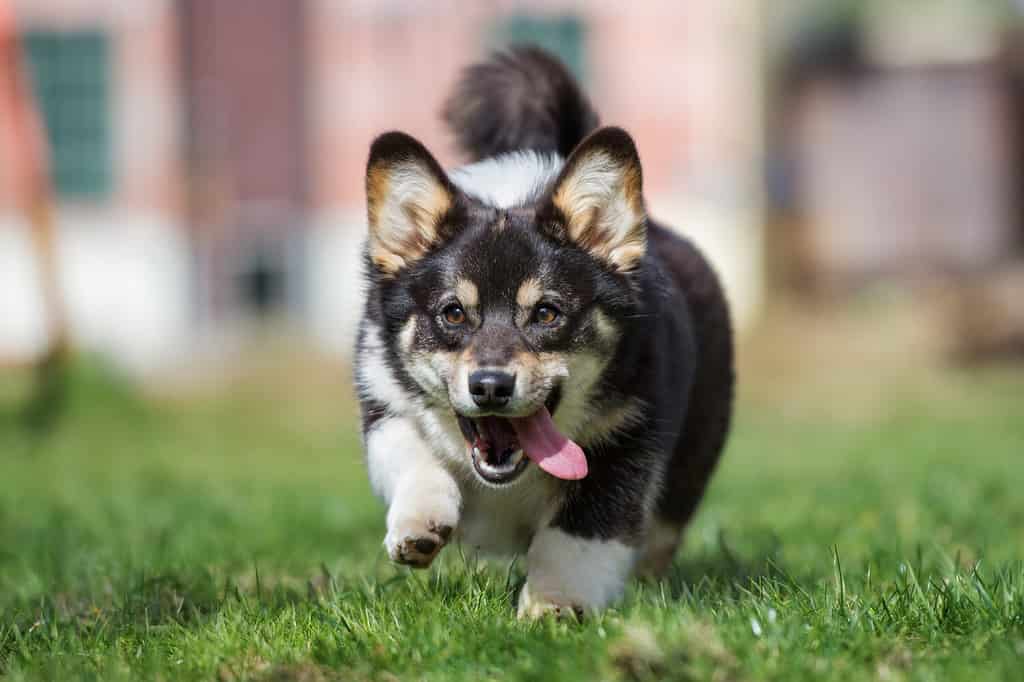Corgis are one of the most popular dog breeds. They are cute, loyal, and have outgoing personalities. According to history, the Celts introduced this ancient breed to Wales from Central Europe over 3,000 years ago. Traditionally considered herding dogs, today, corgis are more commonly kept as pets. The AKC classifies them in the herding group. This breed is trainable and very intelligent. For that reason, they can do a variety of jobs. But can they hunt? Continue reading Corgis as hunting dogs: Pros and limitations to know the answer.
History of the Corgi

The late Queen Elizabeth loved her Corgis; they are considered British Royalty.
©Nataba/iStock via Getty Images
Bred to herd sheep and cattle, corgis continue this tradition. They originated from breeding the original corgi with a spitz-type dog, according to some. As a result, there are now two breeds, the Cardigan and the Pembroke. The Cardigan is the larger of the two and has a tail. The Pembroke has no tail or just a stub of one. This is due to a bob-tail gene or a surgical docking.
These short-legged dogs have heavy double coats with sturdy legs and bodies. In the past, they were hunting companions and would track game. They were also popular as farm dogs and were used to herd animals such as geese, sheep, pigs, and cattle. Additionally, they will keep chickens and their eggs safe from predators.
The late Queen Elizabeth loved her Pembroke Welsh Corgis, and they are considered British Royalty. She acquired her first one in the 1930s. She is probably the most famous Pembroke Welsh Corgi owner in history.
Size
Pembroke Corgis are about 10-12 inches tall and weigh between 23-28 pounds. Cardigans have heavier, muscled legs and longer bodies ranging from 10–13 inches tall and weighing 25-38 pounds.
Caring for Corgis
Their thick coats can cause them to overheat during the summer months. As a result, keep them indoors when they pant excessively during warmer weather or after a workout. Regular brushing and bathing will remove their dead hair and minimize shedding. Always provide them with clean water to drink. Exercise when the temperatures are cool; mornings are the best. Most importantly, do not allow them to jump off high surfaces, as they can injure their spines.
Personality Traits
Corgis have a big dog attitude. They are spirited, athletic, affectionate, and very smart. Quick to learn, they possess problem-solving abilities and independent judgment common in herding breeds. Excellent as watch and guard dogs, their loud bark can deter intruders. However, if not given proper training, they can become aggressive and bark excessively.
But Can They Hunt? Corgis as Hunting Dogs: Pros and Limitations to Know

Sharp eyesight and a strong nose aid them when hunting in challenging environments.
©eAlisa/iStock via Getty Images
They can’t hunt in the traditional sense that other dogs can, but they have been known to hunt vermin and small animals. Corgis can be trained to hunt because they have been used for hunting foxes, hares, and rabbits. They circle prey and drive them toward hunters. If properly trained, they can also hunt pheasant. Typically, hunting dogs locate and capture game. While working, dogs perform tasks such as carting, retrieving, guarding, and herding. The corgi falls more naturally into the second category.
Pros
- Their history of hunting small animals and rodents makes them prized for their pest control abilities.
- Sharp eyesight and a strong nose aid them when hunting in challenging environments.
- They are brave and fearless, known to track badgers to their dens.
- Their low stature enables them to nip the heels of animals they herd without getting kicked.
- Tapping into their herding instinct, they can flush out birds or drive game toward hunters.
Cons
- Because of their short stature, they could have problems in areas covered in brush or other thick foliage.
- They are easily distracted and lack the stamina for long hunts.
- Do not expect them to take down deer or larger game due to their short stature.
- Hunting large game will overtax them, causing possible injuries.
Training a Corgi to Hunt
Use patience, positive reinforcement, and consistency to train corgis. Basic obedience skills are first needed, followed by more advanced commands such as fetching or staying in one location while tracking the game. Most importantly, do not forget to reward them after completing training. Give them rewards and praise quickly to eliminate discouragement. Training can take between one to six months of consistent work. Keep sessions short and fun to maintain their interest. Ensure to acclimate your dog to the sound of gunfire so it does not scare them.
Teach tracking skills with toys and treats for rewards. Whistling is an effective way to communicate commands. Practice in different settings using a variety of terrain and weather conditions so they will adapt to different situations. Do not overwork your dog because hunting can be very demanding. Start with small game such as hares or rabbits, and familiarize them with the animal they will be hunting so they understand the goal.
A Versatile Breed

Most of all, Corgis are loyal and loving companions.
©otsphoto/Shutterstock.com
Hunting is not the only activity corgis can learn. They also pull sleds or carts from farm settings to snowy environments. They make great guard dogs and will protect property and their owners. Eager to please and perform tricks, they are fast and agile, making them natural on agility courses. Train them as service dogs to aid those with mental or physical disabilities. Their outgoing personalities and friendly nature make them wonderful therapy dogs. When training them to assist with search and rescue missions, a keen sense of smell is an asset. And most of all, they are loyal and loving companions.
Possible Health Problems
All corgis have achondroplasia, a form of dwarfism resulting in shorter legs. This intentional genetic mutation gives them their short stature. However, it may also contribute to health issues such as hip dysplasia, which causes loss of joint function and development of the hip joint. Obesity from lack of exercise makes it worse. Other health issues they may encounter include:
- Progressive retinal atrophy, which affects their eyes, leading to blindness.
- Degenerative myelopathy affects the brain stem, spinal cord, and central nervous system, which results in decreased muscle mass, limb paralysis, and muscle atrophy.
- Von Willebrand’s Disease causes decreased blood clotting.
Not all corgis have these issues, but it is wise to take precautions by keeping their weight within limits, exercising them, and ensure they do not jump from high places to protect their backs.
Conclusion
Today, the corgi has evolved from a farm dog to a family pet. This breed is very smart and can do various tasks, as we reviewed in Corgis as hunting dogs: Pros and limitations to know. Give them lots of exercise and attention to keep them happy. Corgis become bored easily. As a result, they may develop destructive behaviors and behavioral issues. A normal lifespan is between 12-15 years, so they are a long-term commitment. Their herding trait is intact, and they are capable of herding as much today as they were thousands of years ago.
The photo featured at the top of this post is © Vera Reva/Shutterstock.com
Ready to discover the top 10 cutest dog breeds in the entire world?
How about the fastest dogs, the largest dogs and those that are -- quite frankly -- just the kindest dogs on the planet? Each day, AZ Animals sends out lists just like this to our thousands of email subscribers. And the best part? It's FREE. Join today by entering your email below.
Thank you for reading! Have some feedback for us? Contact the AZ Animals editorial team.






